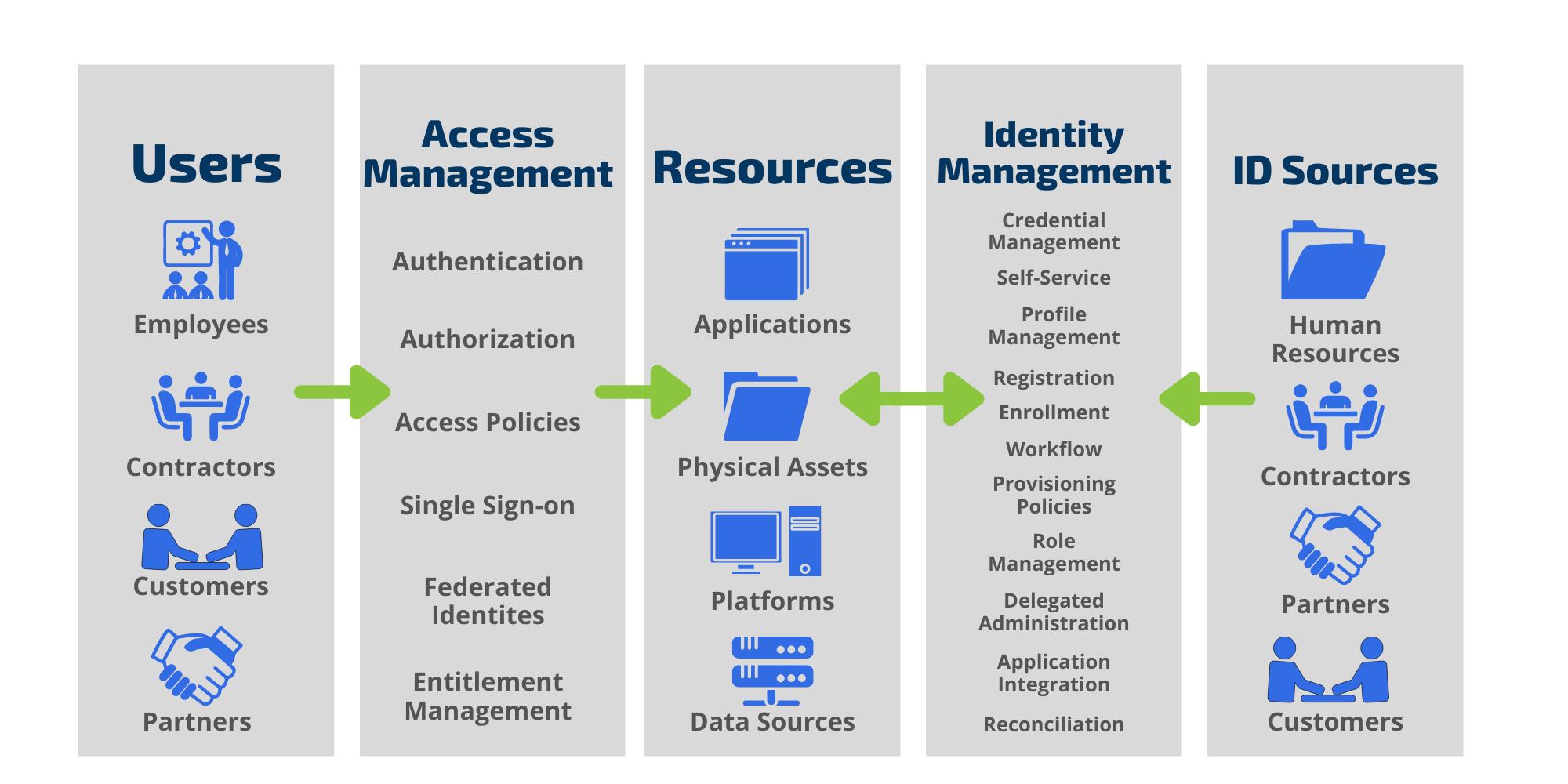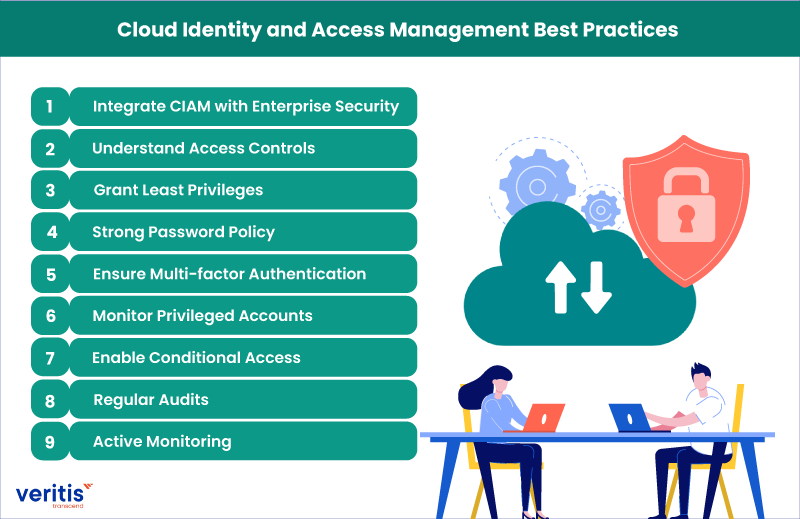The rise of cloud computing has brought convenience and flexibility to businesses of all sizes. However, with great power comes great responsibility. As more businesses migrate their operations to the cloud, the need for robust identity management becomes increasingly important. This is especially true for small and medium-sized businesses (SMBs) that may not have the resources to implement complex security solutions.
In this article, we will explore the essential identity management tips that SMBs need to consider to secure their cloud access. From multi-factor authentication to access controls, we will provide practical advice that can help SMBs protect their data and operations in the cloud. So, whether you are a small business owner or an IT professional working for an SMB, read on to learn how you can enhance your cloud security posture.

Securing Cloud Access: Essential Identity Management Tips for SMBs
1. Implement Multi-Factor Authentication
In today’s digital age, having a strong password is not enough to keep your business’s data secure. That’s why it’s essential to implement multi-factor authentication (MFA) for all cloud access. MFA adds an extra layer of security by requiring users to provide two or more forms of identification before accessing data. This can include something they know, such as a password, along with something they have, like a security token or fingerprint.
To make the most of MFA, it’s important to choose the right authentication methods for your business’s needs. This might include SMS codes, biometric authentication, or hardware tokens. By implementing MFA, you can significantly reduce the risk of unauthorized access to your cloud data.
2. Set Up Role-Based Access Control
Another essential identity management tip for SMBs is to set up role-based access control (RBAC). This allows you to control who has access to what data and functions within your cloud environment. With RBAC, you can assign specific roles to users based on their job duties and level of access needed.
RBAC can help prevent employees from accessing data they don’t need to do their job, reducing the risk of accidental or intentional data leaks. It can also simplify access management by allowing you to quickly add or remove access to specific resources as needed.
3. Regularly Review and Audit Access Permissions
It’s essential to regularly review and audit access permissions for your cloud environment to ensure that only authorized users have access to your data. This can help you identify any gaps in your security and prevent unauthorized access.
Regularly reviewing access permissions can also help you identify potential security threats, such as employees who are no longer with the company but still have access to data. By auditing access permissions, you can quickly identify and revoke access for users who no longer need it.
4. Use Single Sign-On (SSO) for Cloud Access
Single sign-on (SSO) is another essential identity management tip for SMBs. SSO allows users to access multiple cloud applications and services with a single set of login credentials. This not only simplifies the login process for users but also makes it easier for you to manage access to cloud resources.
With SSO, you can easily add or remove access to cloud applications and services for specific users or groups. This can help you maintain control over who has access to your data and simplify access management.
5. Educate Employees on Best Security Practices
One of the most important aspects of identity management is educating your employees on best security practices. This can include things like how to create strong passwords, how to avoid phishing scams, and how to recognize potential security threats.
By educating your employees, you can help prevent accidental data leaks and reduce the risk of unauthorized access. It’s also important to regularly update your employees on new security threats and best practices to help them stay informed and vigilant.
6. Implement Data Encryption
Data encryption is another essential identity management tip for SMBs. Encryption involves converting data into a coded format that can only be read by authorized parties. This can help prevent unauthorized access to your data, even if it’s intercepted during transmission or storage.
It’s important to choose the right encryption method for your business’s needs, whether it’s at rest, in transit, or both. You should also regularly review and update your encryption policies as needed to ensure that your data remains secure.
7. Use Identity Governance and Administration (IGA) Tools
Identity governance and administration (IGA) tools can help you manage your business’s identity and access management (IAM) policies. These tools can automate many of the tasks involved in IAM, such as provisioning and deprovisioning user accounts, managing access permissions, and conducting audits.
By using IGA tools, you can reduce the risk of human error in IAM and ensure that your policies are consistently enforced across your cloud environment.
8. Consider Cloud Access Security Brokers (CASBs)
Cloud access security brokers (CASBs) are another tool that SMBs can use to secure their cloud access. CASBs sit between your business’s cloud applications and your users, providing an additional layer of security. They can help you monitor and control cloud access, detect potential security threats, and enforce policies across multiple cloud applications.
CASBs can be especially useful for businesses that use multiple cloud applications and services, as they provide a centralized way to manage access and security across these platforms.
9. Regularly Monitor and Analyze Logs
Finally, it’s essential to regularly monitor and analyze logs for your cloud environment. Logs can provide valuable information about who is accessing your data, when they’re accessing it, and from where. By regularly monitoring logs, you can quickly identify potential security threats and take action to prevent them.
It’s important to choose the right log management tool for your business’s needs and regularly review and update your log management policies as needed.
10. Benefits of Effective Identity Management for SMBs
Effective identity management is essential for SMBs that want to keep their cloud data secure. By implementing these tips, businesses can reduce the risk of unauthorized access, prevent accidental data leaks, and simplify access management. Other benefits of effective identity management for SMBs include:
– Increased productivity: With streamlined access management, employees can quickly and easily access the resources they need to do their job.
– Compliance: Effective identity management can help businesses meet regulatory requirements for data security and privacy.
– Reputation: Secure cloud access can help businesses build trust with customers and partners, enhancing their reputation in the marketplace.
When it comes to securing cloud access, SMBs can’t afford to take chances. By implementing these essential identity management tips, businesses can reduce the risk of data breaches and other security threats, while maintaining control over their cloud environment.
Frequently Asked Questions
What is cloud access security?
Cloud access security refers to the set of policies, technologies, and controls that are put in place to protect cloud resources and data from unauthorized access, theft, or misuse. The primary goal of cloud access security is to ensure that only authorized users are granted access to cloud resources and that they are able to access those resources securely and without any risk of data loss or corruption.
With the increasing popularity of cloud computing, cloud access security has become increasingly important for businesses of all sizes. SMBs, in particular, need to pay close attention to cloud access security to ensure that they can operate securely in the cloud environment without putting their data and resources at risk.
What are the basic identity management tips for SMBs to secure cloud access?
Identity management is a critical component of cloud access security. The following are some basic identity management tips that SMBs can use to secure cloud access:
1. Implement strong password policies: Ensure that all users have strong, unique passwords that are changed regularly.
2. Use multi-factor authentication: Implement multi-factor authentication to provide an additional layer of security beyond passwords.
3. Use role-based access control: Implement role-based access control to ensure that users only have access to the resources they need to perform their job functions.
4. Conduct regular access reviews: Regularly review user access to ensure that only authorized users have access to cloud resources.
Why is it important for SMBs to secure cloud access?
Securing cloud access is critical for SMBs for several reasons:
1. Protecting sensitive data: SMBs may store sensitive data in the cloud, such as customer information or financial data. Securing cloud access ensures that this data is protected from unauthorized access or theft.
2. Ensuring business continuity: Cloud services are often essential to the operation of SMBs. Securing cloud access ensures that these services remain available and that the business can continue to operate even in the event of a security breach.
3. Compliance requirements: Many SMBs are subject to regulatory requirements that mandate the protection of sensitive data. Securing cloud access ensures that these requirements are met and that the business remains compliant.
What are the risks of not securing cloud access for SMBs?
The risks of not securing cloud access for SMBs include:
1. Data breaches: Without proper security measures in place, SMBs are at risk of data breaches that can result in the loss or theft of sensitive data.
2. Business disruption: A security breach can disrupt business operations and lead to downtime and lost productivity.
3. Legal and financial consequences: SMBs that fail to secure cloud access may be subject to legal and financial consequences, such as fines, lawsuits, and loss of business.
How can SMBs ensure ongoing cloud access security?
Ensuring ongoing cloud access security requires a comprehensive approach that includes regular monitoring, testing, and updates. The following are some best practices that SMBs can use to ensure ongoing cloud access security:
1. Conduct regular security assessments: Regularly assess cloud access security to identify vulnerabilities and areas for improvement.
2. Stay up to date with security updates: Stay informed about security updates and patches for cloud services and implement them promptly.
3. Provide regular security training: Ensure that all users are aware of best practices for cloud access security and understand their role in maintaining security.
4. Have an incident response plan: Develop an incident response plan that outlines steps to take in the event of a security breach.

In conclusion, securing cloud access is crucial for small and medium-sized businesses (SMBs) to prevent cyberattacks and data breaches. With the increasing number of cloud services and applications, having proper identity management practices is essential to protect sensitive information.
Firstly, SMBs should implement strong password policies and multifactor authentication to ensure that only authorized personnel can access the cloud platforms. Secondly, regular monitoring and auditing of user activities can help detect any suspicious activity and prevent unauthorized access. Lastly, SMBs should consider using identity and access management (IAM) tools to centralize user management and automate identity workflows.
Overall, SMBs must prioritize identity management to secure their cloud access and protect their sensitive data from cyber threats. By implementing these essential tips, SMBs can mitigate risks and ensure the confidentiality, integrity, and availability of their cloud data.
